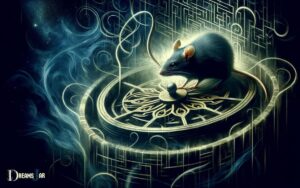Killing a Pigeon Dream Meaning: Releasing Tension!
Dreaming about killing a pigeon can have multiple interpretations depending on the dreamer’s current life situation.
Often, it signifies releasing tension or expressing frustration. It could also symbolize the end of peace or innocence in one’s life.
Dreams are highly personal, so reflecting on the emotions felt during the dream and the events surrounding it can provide a more accurate meaning.
The act of killing in a dream often represents the dreamer’s desire to cut ties with certain aspects of their life.
Pigeons in dreams generally symbolize peace, love, or communication due to their historical role as messengers.
Killing a pigeon might indicate:
For example:
- If the dreamer is overwhelmed by certain messages or news, killing the pigeon may symbolize wanting to silence the noise.
- If the dreamer feels guilty, the dead pigeon could represent self-punishment.
Dreaming of killing a pigeon often reflects complex emotions and can be a call to examine personal feelings and current stressors in life.

Key Takeaway
Symbolism of Killing
I often find that the symbolism of killing in dreams can evoke strong emotions and provoke deep introspection.
When we dream of killing, it’s essential to recognize that the act of killing in a dream is often symbolic rather than literal.

It typically represents a desire to end or eliminate something in our waking lives, such as a habit, a relationship, or a situation.
It can also signify the need for change or the resolution of a difficult issue. It’s important to approach these dreams with an open mind and a willingness to explore our emotions and subconscious thoughts.
By delving into the symbolism of killing in dreams, we can gain valuable insights into our innermost feelings and challenges.
Pigeon as a Dream Symbol
When considering the symbolism of a pigeon in dreams, it’s important to understand its representation as a harbinger of peace and gentleness.

Pigeons hold various symbolic meanings in dreams, such as:
- Peace: Pigeons are often associated with peace and harmony, symbolizing a calm and tranquil state of mind within the dreamer.
- Communication: The gentle cooing of pigeons may represent a need for better communication or a message that needs to be conveyed.
- Innocence: Pigeons are often seen as innocent creatures, reflecting purity and simplicity in the dreamer’s life.
- Freedom: The image of a pigeon in flight can symbolize a desire for freedom or the need to break free from limitations.
Understanding the pigeon’s symbolism in dreams can provide insight into the dreamer’s emotions and subconscious thoughts.
Aggression and Suppression
When I dreamt of killing a pigeon, it stirred up feelings of aggression and suppression within me. The symbolism behind this act and the emotional implications of my aggression are worth exploring.

Let’s delve into the deeper meaning behind pigeon-killing in dreams and the impact of suppressed emotions.
Symbolism of Pigeon-Killing
The act of killing a pigeon in a dream often symbolizes aggression and suppression. This symbolism can be quite vivid and impactful, as the image of pigeon-killing evokes strong emotions and associations.
When interpreting this dream scenario, it’s essential to consider the following:
- Violence: The act of killing inherently implies an element of violence, reflecting pent-up aggression or feelings of anger within the dreamer.
- Control: The act of suppressing a pigeon through killing may signify a desire for control or an attempt to repress certain emotions or aspects of oneself.
- Freedom: The pigeon, often associated with freedom, may represent the need to break free from constraints or societal pressures.
- Conflict: Killing a pigeon in a dream can also symbolize inner conflicts or struggles, highlighting the need for resolution or catharsis.
Understanding these symbolic elements can provide insights into the dreamer’s emotional state and subconscious desires.
Emotional Implications of Aggression
In my interpretation, killing a pigeon in a dream signifies the emotional implications of aggression, specifically addressing the aspects of aggression and suppression.
Dreams of aggression, such as killing a pigeon, may reflect underlying emotions of anger, frustration, or a desire for control. It could indicate that there are suppressed feelings or unresolved conflicts within oneself that need attention.
The act of killing in the dream may symbolize the need to confront or address these emotions rather than suppressing them. It’s essential to acknowledge and process these emotions in a healthy way to prevent them from manifesting in harmful behaviors in waking life.
Understanding the emotional implications of aggression in dreams can serve as a prompt for introspection and seeking resolution for underlying emotional turmoil.
Fear and Anxiety
When it comes to dreams about killing a pigeon, the feeling of fear or anxiety can be overwhelming. It’s important to understand the interpretation insights behind such dreams and find healthy ways to cope with nightmares.

Let’s explore the significance of fear and anxiety in these dreams and how to address them effectively.
Dream Interpretation Insights
Feeling fear and anxiety in a dream can be unsettling and impactful. It’s a common experience, and there are valuable insights to be gained from exploring these emotions in dreams. When fear and anxiety manifest in a dream, it can feel as real as it does in waking life.
The mind processes these emotions in complex ways, and understanding their presence in dreams can provide important self-reflection and growth.
Here are some key insights to consider:
- Fear and anxiety in dreams may symbolize unresolved stress or concerns in waking life.
- Confronting these emotions in dreams can lead to a sense of empowerment and overcoming challenges.
- Seeking support or guidance for managing fear and anxiety in waking life may also help alleviate these feelings in dreams.
- Exploring the root causes of fear and anxiety in dreams can lead to valuable self-discovery and emotional healing.
Coping With Nightmares
Experiencing nightmares can be distressing, but coping with fear and anxiety in dreams is essential for maintaining mental well-being. When I have a nightmare, it can leave me feeling scared and unsettled.
One technique that has helped me is to practice relaxation and mindfulness before bed. This can help me feel more grounded and less likely to have intense nightmares.
Additionally, when I wake up from a nightmare, I find it helpful to engage in calming activities such as reading a book or listening to soothing music.
It’s important to remember that nightmares are a natural part of processing emotions, and finding healthy ways to cope with them can make a significant difference in managing fear and anxiety.
Understanding and addressing these feelings in dreams can also lead to better overall mental health.
Loss and Grief
During times of loss and grief, I often find myself reflecting on the significance of the emotions I am experiencing. It’s a deeply personal journey, filled with a range of emotions that can be difficult to navigate.

In these moments, I’ve learned that it’s okay to feel a whirlwind of emotions, and that it’s important to give myself the space and time to process them.
Here’s what grief feels like to me:
- A heavy weight on my chest, making it hard to breathe
- Waves of sadness that come and go unexpectedly
- A deep longing for what has been lost
- Moments of clarity and acceptance, followed by a resurgence of pain
Understanding and accepting these emotions has been a crucial part of my healing process. It’s a journey, and I’m learning to embrace it with patience and self-compassion.
Transformation and Change
In moments of loss and grief, I frequently find myself pondering the profound impact of emotions. It is during these times of upheaval that transformation and change often take root within us.

When we experience loss, it can be a catalyst for reevaluating our lives and making necessary adjustments. It’s in these moments of introspection that we may find the courage to let go of what no longer serves us and embrace new beginnings.
Change, although daunting, can lead to personal growth and the opportunity to shape our lives in a way that aligns more closely with our true selves.
Embracing transformation can be a powerful and liberating process, allowing us to evolve and adapt to the ever-changing circumstances of life.
Guilt and Remorse
As I reflect on the process of transformation and change, I can’t help but acknowledge the weight of guilt and remorse that often accompanies it. It’s an inevitable part of growth, a sign that we are aware of our actions and their impact on others.

Guilt weighs heavy on the heart, like an anchor dragging us down, while remorse lingers like a shadow, a constant reminder of our mistakes. It’s a process of grappling with our own humanity, understanding the consequences of our choices, and seeking redemption.
But through this burden, we can learn empathy, humility, and the importance of forgiveness, both for ourselves and others.
Communication and Relationships
Navigating through the complexities of guilt and remorse, grappling with our own humanity and seeking redemption, I find that open and honest communication is essential for fostering healthy relationships.

When we communicate openly, we create an environment of trust and understanding, allowing us to address issues and resolve conflicts effectively.
Here’s a table to illustrate the impact of communication on relationships:
| Poor Communication | Effective Communication |
|---|---|
| Misunderstandings | Clarity and understanding |
| Resentment | Empathy and connection |
| Conflict | Resolution and harmony |
| Distance | Closeness and intimacy |
Seeking Inner Peace
Seeking inner peace involves recognizing the value of solitude and introspection in my personal journey towards emotional balance and tranquility.

In my quest for inner peace, I find that:
- Peace can be found in the quiet moments of reflection and self-discovery.
- Letting go of negativity and embracing positivity is essential for inner peace.
- Practicing mindfulness and being present in the moment brings a sense of calmness.
- Cultivating gratitude and focusing on the present rather than worrying about the future or dwelling on the past leads to inner peace.
These practices help me create a harmonious space within myself, allowing me to navigate life’s challenges with a sense of calm and clarity.
Conclusion
As I woke up from my dream of killing a pigeon, I couldn’t shake the feeling of guilt and remorse. But as I delved deeper into the symbolism of the dream, I realized it was a message about transformation and change.
It made me wonder what changes are coming my way and how I can navigate them with grace. Dreams are powerful messengers, and I can’t wait to see what unfolds next.






